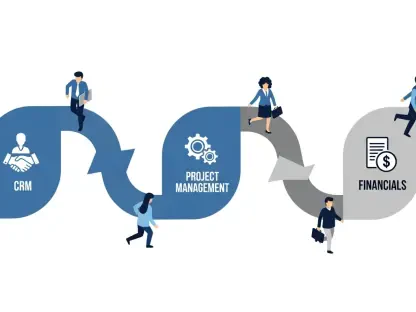Setting the Stage for a DevSecOps Revolution
In an era where software development cycles are shrinking and cybersecurity threats are escalating, enterprises face an unprecedented challenge: delivering secure, high-quality code at breakneck speed. A staggering 91% of executives now prioritize software innovation as a core business driver, reflecting the urgency to adopt transformative tools. GitLab, a leading player in the DevSecOps arena, has positioned itself at the forefront of this shift by leveraging artificial intelligence (AI) to redefine how development, security, and operations converge. This market analysis explores GitLab’s strategic moves under new leadership, dissecting the trends, data, and projections that signal its potential to dominate the enterprise software landscape. The focus is on how AI integration is shaping market dynamics and what this means for stakeholders navigating the complexities of modern software delivery.
Unpacking Market Trends and GitLab’s Strategic Pivot
The Surge of AI in DevSecOps Ecosystems
The DevSecOps market is undergoing a seismic shift, driven by the integration of AI into software development processes. Enterprises are increasingly adopting platforms that automate repetitive tasks and enhance security protocols, addressing critical pain points like developer skill shortages and rising cyber risks. GitLab has capitalized on this trend by embedding AI-native capabilities into its offerings, setting itself apart from competitors who often retrofit AI into legacy systems. Industry data indicates that the AI-driven software innovation market is projected to surpass $750 billion in value, with platforms prioritizing seamless human-AI collaboration gaining significant traction. GitLab’s focus on automation and efficiency aligns perfectly with this trajectory, positioning it as a key player in a rapidly expanding space.
Leadership as a Growth Accelerator
Central to GitLab’s market strategy is a recent leadership transition that underscores its commitment to AI-driven growth. With Manav Khurana as Chief Product and Marketing Officer, the company has honed in on product-led expansion through self-service tools and streamlined pricing models. This approach has yielded impressive results, including a 122% dollar-based net retention rate and a 31% year-over-year revenue increase to $196 million in the latest quarter. Features like “Explain This Code” and Value Stream Dashboards simplify complex workflows, broadening accessibility for enterprises across sectors. While adoption challenges persist in diverse industries, the early financial metrics suggest a robust foundation for sustained market penetration.
Infrastructure Scaling for Competitive Edge
On the operational front, Manu Narayan’s role as Chief Information Officer is pivotal in fortifying GitLab’s internal systems to support its ambitious AI initiatives. The development of GitLab Duo, an AI-native DevSecOps platform, exemplifies this focus by automating tasks such as code generation and vulnerability resolution, delivering productivity gains of 35-50% for users. Unlike many competitors, GitLab’s ground-up AI integration offers a distinct advantage in efficiency and user experience. However, scaling such infrastructure introduces risks, including potential cybersecurity vulnerabilities and elevated costs. Balancing agility with robust security remains a critical factor in maintaining GitLab’s competitive position in a market hungry for reliable, scalable solutions.
Market Validation Through Metrics and Partnerships
GitLab’s strategic direction is gaining substantial market validation, as evidenced by key performance indicators and industry alliances. The flagship product, GitLab Ultimate, now accounts for 48% of Annual Recurring Revenue, reflecting strong demand for integrated security and compliance tools among enterprises. Strategic partnerships, such as with AWS through GitLab Duo, alongside achieving FedRAMP certification for government compliance, have expanded its reach into regulated sectors. Recognition as a Leader in The Forrester Wave™: DevOps Platforms further cements its standing, with top scores in AI integration. These developments align with broader industry sentiments, where a significant majority of executives view software innovation as essential to business growth.
Future Projections and Emerging Dynamics
AI as the Cornerstone of Software Innovation
Looking ahead, AI is set to become the bedrock of software development, reshaping how enterprises approach DevSecOps. Projections suggest that companies with native AI integration, like GitLab, will lead the charge in capturing market share as demand for automation and security intensifies. A recent survey among C-suite executives revealed that 58% attribute recent business growth to AI investments, highlighting the urgency for platforms to deliver measurable outcomes. GitLab’s current trajectory positions it to tap into this growing appetite, provided it continues to innovate at pace with market needs. The emphasis on productivity-enhancing tools could redefine enterprise expectations over the next few years.
Navigating Regulatory and Technological Shifts
Emerging trends, such as stricter regulatory scrutiny on data security and the proliferation of hybrid cloud environments, are likely to influence platform requirements in the near term. Enterprises will seek solutions that balance compliance with flexibility, a challenge GitLab is well-equipped to address through its focus on integrated security features. The market is also witnessing a shift toward greater customization in DevSecOps tools, as businesses demand tailored solutions for unique operational needs. GitLab’s adaptability under its new leadership will be crucial in meeting these evolving demands, especially as competition intensifies from both established players and emerging startups in the AI space.
Financial Sustainability and Growth Potential
Financially, GitLab demonstrates promising sustainability with non-GAAP operating margins reaching 13.2% in the latest reported quarter, driven by AI efficiencies and strategic cost management. This performance suggests that investments in AI can yield long-term profitability, a critical consideration for enterprises evaluating platform adoption. Projections indicate continued revenue growth if GitLab maintains its focus on customer-centric innovation and operational scalability. For investors, this financial momentum, coupled with strong market positioning, points to a compelling opportunity in a sector poised for exponential expansion over the coming years, from 2025 onward.
Reflecting on Strategic Pathways Forward
Looking back, GitLab’s strategic maneuvers under its revamped leadership have marked a pivotal chapter in the DevSecOps narrative, blending AI innovation with market responsiveness. The company’s ability to achieve significant productivity gains, secure high-profile partnerships, and earn industry accolades has laid a solid groundwork for influence in the enterprise software arena. For businesses and developers, the takeaway is clear: adopting AI-driven platforms that prioritize security and efficiency offers a pathway to navigate the complexities of modern software delivery. Moving forward, enterprises should consider aligning with solutions like GitLab Duo to address immediate operational bottlenecks while investing in training to maximize tool adoption. For IT leaders, focusing on scalable infrastructure akin to GitLab’s internal advancements could ensure resilience amid rapid technological shifts. Ultimately, staying ahead in this dynamic landscape requires a proactive embrace of AI as a collaborative partner, not just a tool, to drive sustained growth and innovation.









